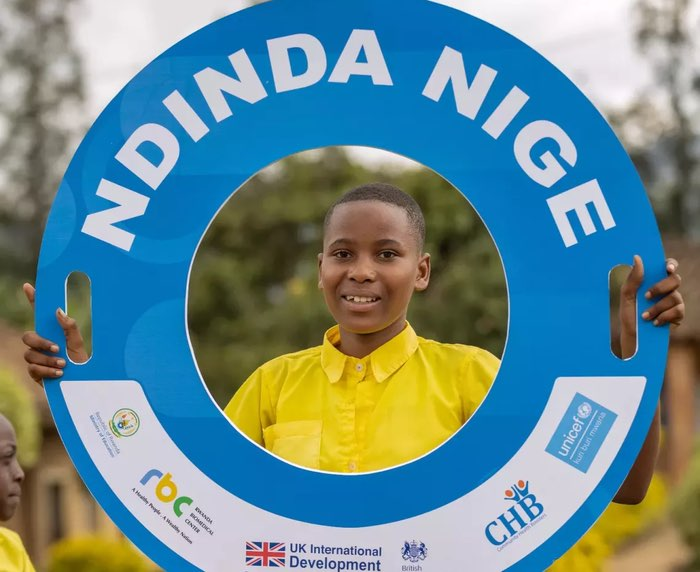
By Theoneste Iyakaremye
In Rwanda’s Gakenke District in the north of the country, two young girls, Denise Twizerimana and Laetitia Nyirahakizimana, are rewriting their stories of success. In their school, Ecole Primaire de Murandi, thanks to the empowering remedial learning programme and health clubs established under the Girls in Rwanda Learn (GIRL) programme—funded by the Foreign, Commonwealth and Development Office (FCDO) and supported by UNICEF Rwanda—their lives are taking a turn for the better.
A struggle transformed
For 12-year-old Twizerimana Denise, a student in Primary four at Ecole Primaire de Murandi, school had always been a struggle. Falling behind in subjects like Mathematics and English, she often felt discouraged and overwhelmed. “I was frustrated. I thought school wasn’t for me,” Denise recalls, reflecting on her challenges before the remedial learning programme was introduced.
Denise’s experience is not unique. In 2022-2023, 6.8 per cent of female students in Rwanda faced dropout challenges (Source: Ministry of Education), with academic pressure compounded by family responsibilities and limited resources. However, everything began to change when her school became one of 155 schools selected for the GIRL programme. This partnership between UNICEF and FCDO provides remedial learning support to students at risk of dropping out of school.
A fresh start
Denise now attends remedial learning sessions where teachers use tailored methods to help students revisit and reinforce challenging subjects. For Denise, the impact has been profound. “The teachers are patient and explain things in a way I can understand. I feel more confident now, and I can see real changes in my performance,” she shares with a smile.
Denise’s newfound confidence makes plans for her future. “I want to become a doctor. I now believe that anything is possible with hard work and the right support,” she says, looking forward to a brighter future. Her academic performance has improved significantly, and she is excelling in subjects that once felt insurmountable.
A teacher’s perspective
Eric Hagumimana, an English teacher at Ecole Primaire de Murandi, has witnessed firsthand the remarkable changes his students are undergoing since the introduction of the GIRL programme. “Before this programme, many of my students struggled to keep up with the curriculum,” he explains. “They would often lose motivation and fall further behind. But the remedial learning sessions have completely changed that.”
Eric highlights the transformation in Denise and her classmates. “Denise used to be very quiet in class. She rarely participated, and you could see her frustration. And now, she is one of the most active students. She asks questions, volunteers answers, and even helps her peers during group work.”
He credits the programme’s approach of individualized support for these changes. “The remedial sessions allow us to focus on the areas where students need the most help. “We’ve seen their confidence grow as they improve in concepts they once struggled with,” he says.
For Eric, the impact goes beyond academics. “This programme is giving our students hope. They are starting to believe in themselves, and that belief is contagious. It has changed the atmosphere in our classrooms. Students are more engaged, and their enthusiasm for learning is inspiring,” he adds.
Building confidence through health clubs
Meanwhile, Laetitia Nyirahakizimana, a 12-year-old in Primary Five (P5) at the same school, has been deeply impacted by the NDINDA NIGE GIRL programme (“Protect me so I can learn”) supported by UNICEF and FCDO.
This initiative fosters the creation of health clubs in schools, equipping students with vital life skills, including education on sexual and reproductive health, HIV, mental health, child protection, and gender-based violence. I used to be shy and lacked information about sexual and reproductive health and rights, and I didn’t know how to protect myself.” Laetitia admits. “But through the health club, I’ve learned to take care of myself and make informed decisions about my reproductive health. I now know what to do if I ever face danger, and I feel empowered to speak up.” shares a confident Laetitia.
The health clubs have introduced Laetitia to topics on adolescents’ health and well-being and on the importance of safe relationships. They are also helping to build her confidence, self-esteem and leadership skills. These interactive sessions have not only educated her but also created a supportive community among students. “We learn together and help each other. It’s a safe space where I can express myself without fear,” she adds.
Through digital health platforms, board games and hotlines, Laetitia and her peers also have access to reliable information, health resources, and support in engaging, fun, and confidential ways, empowering them to make informed decisions about their health and well-being.
A wave of change
Denise and Laetitia’s stories highlight the powerful impact of remedial education and health support in Rwandan schools. By improving foundational academic skills and providing essential life skills, the GIRL programme is helping young girls overcome challenges, build confidence, and stay in school.
As Denise and Laetitia continue their educational journeys, they are not only transforming their own lives but also inspiring others in their community. With the support of the GIRL programme’s remedial learning sessions and health clubs, they have become champions of resilience, learning, and empowerment.
“I’m no longer afraid of the future,” says Denise, her eyes filled with determination. “Now I know that with the right help, I can achieve anything.”
For Laetitia, the health clubs have fueled her ambition to give back. “I want to help other girls like me. I want them to know they are never alone,” she says, inspired to support her peers in the same way she has been supported.
For Eric, the changes in his students reaffirm the importance of programmes like GIRL. “Education is not just about grades; it’s about giving children the tools to dream and the confidence to pursue those dreams. The GIRL programme is doing just that,” he concludes.
Through the GIRL programme, these young learners are not just staying in school—they are laying the foundation for their brighter, healthier, and more successful futures. (End)
